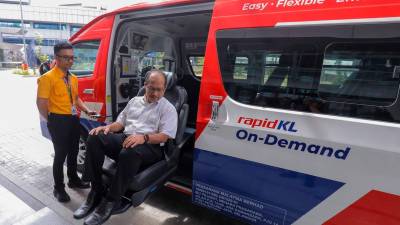PETALING JAYA: Users of the Demand Responsive Transit (DRT) vans, which also include senior citizens, have highlighted concerns about “unfriendly” accessibility, arrival delays and payment inflexibility.
As the use of DRT vans grows in urban areas, commuters have praised its convenience but also voiced out mixed experiences on using the transport service.
A 24-year-old from Subang Jaya, who declined to be named, claimed to have used the vans a few times a month.
He said while the service was affordable, the multiple applications to book the service and their specific-location accessibilities left him puzzled.
“In Subang, I use the Mobi app, though there are some areas that use Kummute. But in other areas, you need Kumpool or Trek. That is confusing. There should be a single app nationwide.”
He also said the registration process, which requires uploading identity cards and photos, is overly technical, especially for the elderly.
“Many elders do not have smartphones that can run these apps. Even some youths who are not tech savvy may struggle,” he said, adding that payment methods were too narrow.
“It is heavily tied to Touch ’n Go. Debit and credit card options should already be standard. A card terminal in vans would make things much easier.”
Student Sasmetasri Ram, 22, also claimed to rely on the service two to three times a week.
She said the app she uses, Kummute, is convenient but inconsistent.
“Sometimes the van takes longer than estimated, which is stressful if I have to catch a train. Once during peak hour, the wait stretched to almost an hour. I could not wait any longer, so I just booked a Grab instead.”
She suggested a standard flat rate such as RM1 or RM2 for easier planning.
Another student, Silvanus Raj John Winston, 21, uses the DRT vans daily in Kelana Jaya and echoed similar concerns.
“The app I used for booking, Kumpool, works but delays during peak hours are frustrating. The system is not inclusive.
“Public transport should be for everyone, not just the tech-savvy. A kiosk or phone-in system could help.”
In response to growing concerns over accessibility and rigidity, Rapid Bus acting CEO Ku Jamil Zakaria said app-only bookings are essential for system efficiency and fairness.
He acknowledged public concern about elderly access, but said cash or walk-in access would undermine the service structure.
“Operationally, the driver already has a list of bookings to follow. If there is no booking through the system, how is the driver supposed to know who to pick up?
“We cannot do things just by preference or feel. We hear all the feedback, of course, but the booking system is our foundation.”
When asked about flexibility in payments, Ku Jamil said debit card and Touch ’n Go options are already in place, but must still be linked to the app.
“If another person without a booking suddenly comes in and demands a ride, it throws off the schedule. The person who booked ends up waiting longer and the sequence gets disrupted.”
Instead of relaxing the system, Rapid Bus is working on app updates to allow proxy bookings.
“A child can book for a parent and the parent just waits at the pickup point. But the booking has to go through the system.”
There are currently four applications to book the service; Rapid On-Demand, or location-based apps such as Kummute, Kumpool, Trek or Mobi.
Rapid Bus operates 287 vans nationwide, with an average of 15,000 daily users, 13,000 in the Klang Valley and 2,000 in Penang.
For long-term inclusivity efforts, Rapid Bus plans to roll out 300 more DRT vans and 100 additional Rapid Mobility vans for wheelchair users and disabled persons by 2027.
